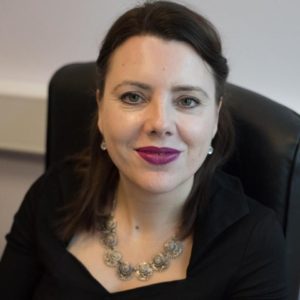The MA Professional Practice (Voice Pedagogy) offers singing teachers the chance to deepen their professional knowledge in a rigorous but supportive environment. BAST spoke to Debbie Winter, the driving force behind the course.
How the course started
For many years Debbie Winter juggled two somewhat disparate careers: that of law lecturer and semi pro jazz singer.
When she eventually decided to turn her back on law altogether, and immerse herself fully in the world of singing, she hit a bump in the road.
“I wanted to train to be a voice coach, but I just couldn’t find the training I was looking for,” she says.
“I thought there has to be a different way forward where people can get a qualification that’s regulated and not personality driven.”
Winter did an Estill Course and started on the Certified Master Teacher (CMT) pathway, before grasping the nettle and creating her own study programme.
To achieve her aim Winter started Voice Workshop, which provides accredited short courses and the Masters in Professional Practice (Voice Pedagogy). The MA is delivered with the Welsh Institute of Work Based Learning and the University of Wales (Trinity St David).
Postgraduate studies – what does it take?
Let’s be frank: the MA (Voice Pedagogy) requires a considerable commitment over several years. Students start by doing a PG Certificate, which takes 15 months. It then takes a further 15 months to complete the full MA. The good news is this can all be done while working. As the course was designed by a singing teacher for working singing teachers and other voice experts, it specifically caters for working professionals and can be done online.
What the MA (Voice Pedagogy) course offers
Many MAs have a one-size-fits all structure, but the MA Professional Practice (Voice Pedagogy) offers a great deal of flexibility.
“Rather than follow a rigid programme you design your own pathway within parameters,” Winter says.
This allows students to pursue their own specific areas of interest and those that relate to their practice. You can expect a blended learning approach combining online lectures – that cover everything from anatomy, the diagnosis of vocal disorders, to acoustics and Chekhov – with independent research.
Choosing your research subjects
Winter says students rarely start the course with a clear idea of what they want to research. And if they do – it usually ends up changing anyway.
“I don’t think a single student has come with an idea and stuck to it,” Winter says.
“Lots of them start out obsessed by the larynx, and with fixed ideas about voice science. But they soon realise that there is so much they can explore.
“Once they immerse themselves in the programme, it opens up a whole new world.”
Recent MA graduates focused on performance anxiety, singing and trauma, the impact of MT culture on young performers.
Mentoring is key to guiding people to make their own choices. “I spend a lot of my time mentoring. I really try to get the heart and soul of people,” Winter says.
Enrolment
The MA (Voice Pedagogy) intake is 40 each year. The next enrolment deadline is 24 April. CPD learning, including BAST Training, can be used to translate into credits (speeding up the process).
Website: workshop.co.uk





